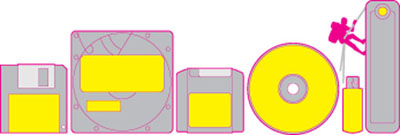
Isn’t it strange how history has been replaced by technology…?
From ‘Eloge de l’amour’, Jean-Luc Godard (2001)
I just finished an article on media and memory for a forthcoming publication on media culture in Flanders and Belgium, partly based on talks I heard and had during the ‘Media, Memory and the Archive’ conference we organised at Argos (October 6 2007, see elsewhere on this blog). It’s based on the paradox between the idea of the prosthetic, networked memory, promised to us by the ubiquitous surveillance and sousveillance technologies (including the ‘life-logging’ trend that we can see coming up in projects like ‘what was I thinking’ (MIT), Lifeblog (Nokia), MyLifeBits (Microsoft), questioned in artists’ projects like Lucy Kimbell’s ‘I measure therefore I am’ or Ellie Harrison‘s ‘Eat 22’ and ‘Gold Card Adventures’) and the inherent variability and instability of these technologies. The essay is basically a exploration of the way these new memory and communication technologies have changed our relation to the world and the past, and the way social memory is constructed. It argues that variability and flux are the new norm and perhaps even, for a whole new generation out there, the main condition of creativity. Memory institutions have to learn to cope with these new paradigms, and try to combine formal (institutionalised) with informal strategies (as in oral media, or the way games are kept alive via communities such as MAME). Like John Sobol recently wrote on the iDC mailinglist: “Loss is only real if you feel you that you have something to lose.”…
The article will be published on this blog